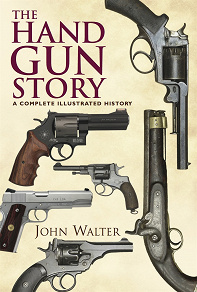
Isbn:
978-17-8346-974-1
Förlag: Pen and Sword
Kategori:
Historia Språk & ordböcker
Tillgänglig sedan: februari 2021
Förlag: Pen and Sword
Kategori:
Historia Språk & ordböcker
Tillgänglig sedan: februari 2021
E-bok
Hand Gun Story
The Handgun Story traces the fascinating history of the 'one hand gun' from its crude fourteenth-century origins to the sophisticated products of today. As technology has progressed, handguns have got smaller and deadlier, to be carried in holsters, pockets and even lady’s mufflers. Today they are the weapons of choice for undercover agents and would - be assassins; ideally suited for both attack and self-defense.
The earliest pistols had a tendency to misfire, but this was cured by the cap-lock. Cap-lock revolvers proved a massive success in the American Civil War with hundreds of thousands used on each side. Self-contained metal-case cartridges were to bring a fundamental change to handgun design: not only by allowing the introduction of revolvers that ejected automatically or were easily reloaded, but also by paving the way for the automatic pistol. World War I provided the handgun with a proving ground. At the end of the hostilities, with so much surplus weaponry, work on the handgun could have ceased; instead, a new developmental phase was begun by the nations that had emerged from the crumbling Imperial empires. During World War II the efficiency of well-established designs was confirmed and new designs, such as the Walther P. 38, showed their potential. The emergence of the submachine-gun in 1945 reduced the status of the handgun – but only temporarily. The need for efficient self-defense shows no signs of lessening; and the rise in shooting for sport, particularly with the revolver, has sharpened the quest for efficiency.
The never ending search for advanced production techniques shows that the handgun has as much a future in the twenty-first century as it had in the heyday of the Wild West, or in the trenches of Passchendaele.
The earliest pistols had a tendency to misfire, but this was cured by the cap-lock. Cap-lock revolvers proved a massive success in the American Civil War with hundreds of thousands used on each side. Self-contained metal-case cartridges were to bring a fundamental change to handgun design: not only by allowing the introduction of revolvers that ejected automatically or were easily reloaded, but also by paving the way for the automatic pistol. World War I provided the handgun with a proving ground. At the end of the hostilities, with so much surplus weaponry, work on the handgun could have ceased; instead, a new developmental phase was begun by the nations that had emerged from the crumbling Imperial empires. During World War II the efficiency of well-established designs was confirmed and new designs, such as the Walther P. 38, showed their potential. The emergence of the submachine-gun in 1945 reduced the status of the handgun – but only temporarily. The need for efficient self-defense shows no signs of lessening; and the rise in shooting for sport, particularly with the revolver, has sharpened the quest for efficiency.
The never ending search for advanced production techniques shows that the handgun has as much a future in the twenty-first century as it had in the heyday of the Wild West, or in the trenches of Passchendaele.
Logga in för att låna
Information
Stöds av följande plattformar
PC/Mac
Surfplatta Läsplatta
Smartphone
